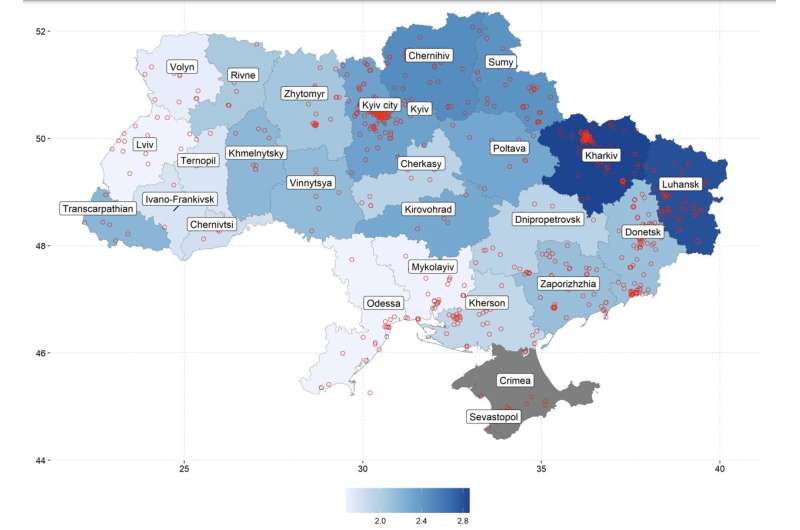Civilian attacks likely to strengthen Ukrainian resistance, say researchers
During the all-out invasion of Ukraine, Russia has deliberately chosen civilian targets, such as apartment buildings, presumably with the goal of deterring Ukrainian resistance. But does such terror deter or, in contrast, motivate resistance among ordinary Ukrainians?
Henrikas Bartusevičius and colleagues conducted two-wave probability surveys in Ukraine in March and April 2022, with approximately 1,000 and 800 respondents in the first and second waves, respectively. The research is published in the journal PNAS Nexus.
Surveys were conducted online by a local survey agency, Info Sapiens. Respondents reported the frequency of military attacks (e.g., artillery shelling) on themselves, family, friends, and acquaintances. Respondents also indicated on a 7-point scale the likelihood of future engagement in four types of resistance: volunteering to care for the victims of war; helping resistance logistics; joining military combat in defense positions; and joining military combat in open battles.
The surveys found that Ukrainians who had been more victimized by Russian violence were more willing to resist—especially to join military combat in defense positions.
According to the authors, the Russian strategy of targeting civilians is not only costly and prohibited under international humanitarian law, but it is unlikely to result in the desired erosion of Ukrainian resistance. According to the authors, terror against civilians is likely to strengthen Ukrainian resistance.
More information:
Henrikas Bartusevičius et al, Russia’s attacks on civilians strengthen Ukrainian resistance, PNAS Nexus (2023). DOI: 10.1093/pnasnexus/pgad386
Citation:
Civilian attacks likely to strengthen Ukrainian resistance, say researchers (2023, December 13)
retrieved 13 December 2023
from https://phys.org/news/2023-12-civilian-ukrainian-resistance.html
This document is subject to copyright. Apart from any fair dealing for the purpose of private study or research, no
part may be reproduced without the written permission. The content is provided for information purposes only.

During the all-out invasion of Ukraine, Russia has deliberately chosen civilian targets, such as apartment buildings, presumably with the goal of deterring Ukrainian resistance. But does such terror deter or, in contrast, motivate resistance among ordinary Ukrainians?
Henrikas Bartusevičius and colleagues conducted two-wave probability surveys in Ukraine in March and April 2022, with approximately 1,000 and 800 respondents in the first and second waves, respectively. The research is published in the journal PNAS Nexus.
Surveys were conducted online by a local survey agency, Info Sapiens. Respondents reported the frequency of military attacks (e.g., artillery shelling) on themselves, family, friends, and acquaintances. Respondents also indicated on a 7-point scale the likelihood of future engagement in four types of resistance: volunteering to care for the victims of war; helping resistance logistics; joining military combat in defense positions; and joining military combat in open battles.
The surveys found that Ukrainians who had been more victimized by Russian violence were more willing to resist—especially to join military combat in defense positions.
According to the authors, the Russian strategy of targeting civilians is not only costly and prohibited under international humanitarian law, but it is unlikely to result in the desired erosion of Ukrainian resistance. According to the authors, terror against civilians is likely to strengthen Ukrainian resistance.
More information:
Henrikas Bartusevičius et al, Russia’s attacks on civilians strengthen Ukrainian resistance, PNAS Nexus (2023). DOI: 10.1093/pnasnexus/pgad386
Citation:
Civilian attacks likely to strengthen Ukrainian resistance, say researchers (2023, December 13)
retrieved 13 December 2023
from https://phys.org/news/2023-12-civilian-ukrainian-resistance.html
This document is subject to copyright. Apart from any fair dealing for the purpose of private study or research, no
part may be reproduced without the written permission. The content is provided for information purposes only.
